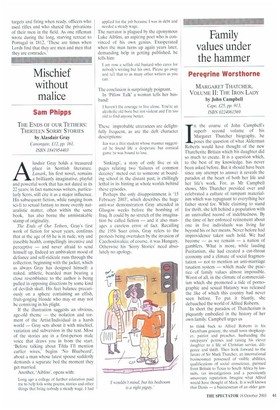Mischief without malice
Sam Phipps
THE ENDS OF OUR TETHERS: THIRTEEN SORRY STORIES by Ala sdair Gray Canongate, £12, pp. 161, ISBN 1841954403 Alasdair Gray holds a treasured place in Scottish literature. Lanark, his first novel, remains a brilliantly imaginative, playful and powerful work that has not dated in its 22 years; in fact numerous writers. particularly Scots, still cite it as a major influence. His subsequent fiction, while ranging from sci-fi to sexual fantasy to more overtly naturalistic matter, often within the same book, has also borne the unmistakable stamp of originality.
The Ends of Our Tethers, Gray's first work of fiction for seven years, confirms that at the age of 68 he is in rude, wry and irascible health, compellingly inventive and perceptive — and never afraid to send himself up. Indeed an ambivalent mood of defiance and self-ridicule runs through the collection, beginning with the jacket, which as always Gray has designed himself: a naked, athletic, bearded man bearing a close resemblance to the author is being pulled in opposing directions by some kind of devilish skull, His feet balance precariously on a sphere containing an elfish, fruit-gorging blonde who may or may not be conniving in his plight.
If the illustration suggests an obvious, age-old theme — the isolation and torment of the Artist/Individual in a harsh world — Gray sets about it with mischief, variation and subversion in the text. Most of the stories are in a first-person male voice that draws you in from the start. 'Before talking about Tilda I'll mention earlier wives,' begins 'No Bluebeard', about a man whose latest spouse suddenly demands a separate bed the moment they get married.
Another, 'Aiblins', opens with:
Long ago a college of further education paid me to help folk write poems, stories and other things that bring nobody a steady wage. I had applied for the job because I was in debt and needed a steady wage.
The narrator is plagued by the eponymous Luke Aiblins, an aspiring poet who is convinced of his own genius. Exasperated when the man turns up again years later, demanding help in getting published, he tells him:
I am now a selfish old bastard who cares for nobody's writing but his own. Please go away and tell that to as many other writers as you can.
The conclusion is surprisingly poignant.
In 'Pillow Talk' a woman tells her husband:
I haven't the courage to live alone. You're an alcoholic old bore but not violent and I'm too old to find anyone better.
These improbable utterances are delightfully frequent, as are the deft character descriptions:
Ian was a thin student whose manner suggested he found life a desperate but comical came he was hound to lose.
`Sinkings', a story of only five or six pages relating two 'failures of common decency' meted out to someone at boarding school in the distant past, is chillingly lethal in its hinting at whole worlds behind these episodes.
Perhaps the only disappointment is '15 February 2003', which describes the huge anti-war demonstration Gray attended in Glasgow weeks before the bombing of Iraq. It could by no stretch of the imagination be called fiction — and it also manages a careless error of fact. Recalling the 1956 Suez crisis, Gray refers to the protests being overtaken by the invasion of Czechoslovakia; of course, it was Hungary. Otherwise his 'Sorry Stories' need absolutely no apology.


































































































 Previous page
Previous page